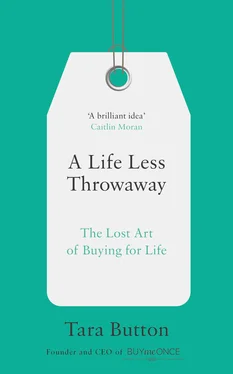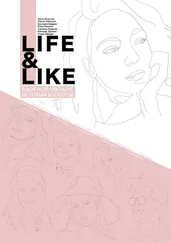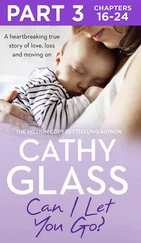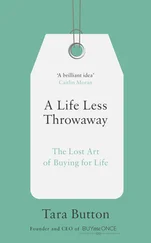But it isn’t just the planet that should concern us. The trend towards materialism is also increasingly taking its toll on our day-to-day lives because it tricks us into losing the personal connections that make us happy.
A study of 2,500 consumers over six years concluded that no matter how much money you had to spend, materialism was linked to an increase in loneliness and loneliness in turn increased materialism. 4In the Seventies and Eighties, only 11–20 per cent of Americans reported that they often felt lonely; in 2010 that figure rose to between 40 and 45 per cent. 5The Mental Health Foundation in the UK also reported in 2010 that 46 per cent of us felt that society was getting lonelier. 6
Relying on social media for connection is like trying to live off multivitamins – they might be a nice add-on, but they don’t feed us in the way we need. Research has shown that increasing your friends on Facebook has no effect on your well-being at all, but increasing your ‘real world’ friends from ten to twenty people results in a significant life-altering improvement – the equivalent of a 50 per cent pay rise. 7
How does materialism make us lonelier? The messages we see in ads and social media channels perpetuate a myth that having things or looking a certain way makes us worthy of love and admiration. It’s very natural to want to feel special and appreciated, so we start to focus on our looks and achievements and buy high-status items that others will admire. However, any admiration or connection we gain is on a shallow level, and because it isn’t based on anything authentic, it leaves us feeling disconnected and unsatisfied. So we try even harder to get the love we need by showing the world our possessions, our status and our achievements, never guessing that the constant focus on the self means that the connection to others isn’t going to happen.
Sadly, materialism and narcissism are on the rise. A study published in 2012 tracked the values of graduates since 1966 and found that the importance given to status, money and narcissistic life goals like ‘being famous’ had risen significantly, whereas the importance given to finding meaning and purpose in life and a desire to help others had fallen. 8In addition, a study of students over the last thirty years has found that college kids today are about 40 per cent lower in empathy than the students of twenty or thirty years ago. 9
We have become ‘all about me’ rather than ‘all about we’. The irony is that self-focused people hurt themselves more than anyone else. I don’t feel that it is a coincidence that the use of antidepressants has gone up 400 per cent in the USA 10and doubled in Britain in the last decade. 11
To add insult to injury, marketers know how much we crave the connections that are the cornerstone of our happiness, so their adverts are full of family bonding and friends having great times – all to sell us goods that in reality are driving us apart.
IS OUR STUFF GETTING IN THE WAY OF WHAT’S IMPORTANT?
In March 2010, a group of five Pacific Islanders who had lived all their lives with practically no possessions were flown to the UK to be part of a TV programme where they looked at British life. 12As they walked around their hosts’ houses and explored London, they were surprised by all the ‘useless extra things’ they saw, saddened that busy commuters wouldn’t stop and talk to them, and shocked at seeing homeless people. This would ‘never be allowed to happen’ in their community.
The tribesmen’s simple lives meant that they hadn’t lost sight of what was important: love, respect and enjoying each other’s company. When they first arrived, they were all given their own room in their host’s big house. Later, when they stayed at a more modest place and all four of them were put together in a small bedroom, they declared themselves happier because now they were ‘able to talk to each other’.
It’s easy to romanticise the ‘noble savage’ life. There are of course many downsides, including lack of healthcare, gender equality and Ben & Jerry’s. But it is interesting to explore how our own society’s values might change if materialism was reduced.
In 2016, my fiancé, Howard, and I were invited to be on a TV show running an experiment to try and discover this very thing. The idea was that all our possessions, including our clothes, would be taken away from us.
‘No bloody way,’ Howard said before I was halfway through explaining the idea. Howard is not a naked person. Not ever. Not even with himself. So Life Stripped Bare went on to be made without us. 13
Six people were stripped bare. Literally. Crouching-beneath-your-window-sill-so-the-neighbours-don’t-see-your-dangly-bits bare. All their stuff was locked away and each day they were able to choose one possession that they most wanted to have back in in their lives. Then (to get as much flesh wobbling as possible), they had to run half a mile up the road to a shed to get it back.
One of the volunteers, Heidi, a 29-year-old pink-haired fashion designer with thirty-one bikinis, sobbed as the removal vans arrived in her trendy area of London. ‘I feel my stuff defines me,’ she said. ‘I want people to like me, think I’m cool, think I’m nice, and if I don’t have my hipster coat, if I don’t have my nails painted or my rings on, I don’t think they will like me …’
On Day 2, after a gruelling night on the floor, she reflected, ‘Yesterday I was crying because I wanted everything. Today I just want my mattress.’
In fact she got more than that. Out on the street, two passing girls stopped to help her carry the mattress back to her house and they bonded over the funny situation.
Almost in tears, Heidi said to camera, ‘Now I’ve got some friends, I honestly feel I’ve got everything … When you have nothing, people make the whole world of difference.’
I’d like to turn this on its head and say, ‘When you’ve got people , there’s nothing much else you need in the world.’
All the participants of Life Stripped Bare found that once their basic comfort levels were met, they became less and less bothered about picking up new items from the shed. We can be happy with very little, yet due to materialism, the average home has 300,000 items in it …
So how can we reverse this trend? Let’s start with some exercises to break free of materialism.
exercise
PERSUADE YOURSELF OF THE IMPORTANCE OF NON-MATERIAL ACTIONS
You may think you don’t need persuading that there’s more to life than materialism, especially after reading this chapter, but write an e-mail to yourself about it anyway. This may seem a bit twee, but has been proven by professor and clinical psychologist Natasha Lekes to have a tangible impact on your happiness. 14I’ll even start you off:
Dear me,
This feels odd, but I’m going to tell you about why I think having good relationships, helping the world to be a better place and growing as a person are so important …
exercise
SIGN UP FOR BUYMEONCE MANTRAS
Sign yourself up for free daily mantras at BuyMeOnce.com.These short phrases will help your subconscious make good choices for you and you’ll be less swayed by materialistic messaging. Here are three to get you going:
• ‘I am good enough.’
• ‘I have everything I need to be happy.’
• ‘I am grateful for all I have.’
exercise
SIMPLE WAYS TO COMBAT MATERIALISM EVERY DAY
• Remind yourself on waking that this life is amazing but also short – smile and say thank you for the day.
• Find time each day to focus on your own personal growth and self-worth. (You’ll find ideas in this book.)
• Find people who share your passions and build a sense of community with them.
Читать дальше












